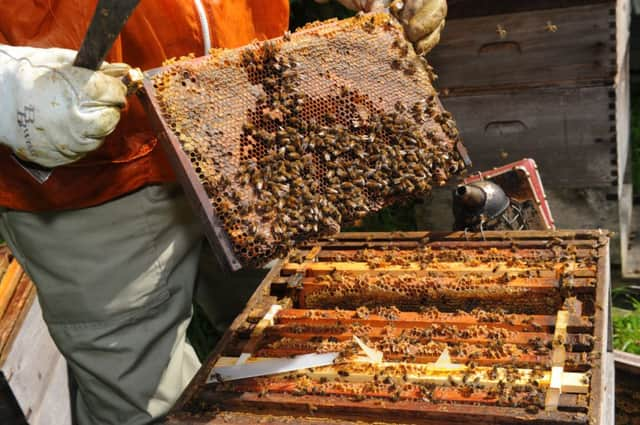Why are the bees dying?


Vast areas seem to be strewn with the small corpses of these essential pollinators.
But, while experts say there may be cause for concern in the long term, there may not be anything too unusual about this summer.
Advertisement
Hide AdAdvertisement
Hide AdMhairi Neill is the secretary of the Glasgow and District Beekeepers Association.
Mhairi maintains that, while there is a mystery to do with bee deaths, this summer has been more about good news.
Mhairi told The Extra: “This summer has been a much better one for the bees that the last two or three.
“The sightings of more dead bees may simply be down to the fact that there are more bees this year.”
Advertisement
Hide AdAdvertisement
Hide AdMhairi explained that the Honeybee only lives for around six weeks during the summer, and that the nests of the bumblebee are only active for a single summer.
She added: “These insects don’t live for long, if there are more of them it may be that is why people are seeing more dead ones.”
But the beekeeper warned we do have to be vigilant: “In the longer term, the bees and other pollinators are having a hard time.
“No specific, singular reason has been found to be at the root of the problems.”
Advertisement
Hide AdAdvertisement
Hide AdThe BBC’s breakfast anchor, Bill Turnbull, himself a keen beekeeper, recently filmed an episode of Horizon for the corporation.
In it he cited three main reasons he could identify as possible reasons for the bee decline: changing climate, disease and our changes in the use of the environment.
Mhairi told us: “Varroa destructor is a disease which weakens the bees and the viruses it spreads can cause many problems for the individual bee and, eventually, the whole colony.”
She added that the way we plant crops and our use of insecticides can have an impact on bee survival.
Advertisement
Hide AdAdvertisement
Hide AdMhairi said: “A lot has been written in the press about honey bees and the problems that we face if we lose these valuable pollinators, but honey bees are only one of the pollinators we depend on.
“There are a great many other pollinators: bumble bees, solitary bees, solitary wasps, etc.
“All of these need protection for the future.
Mhairi points to action most people can take to help survival rates of pollinator: planting pollinator-friendly flowers, leaving a wild area in the garden... or simply maintaining a window box.
“Taking up beekeeping is another alternative.
“There is a course starting in November that is designed to give the participants a full and rounded knowledge of how honeybees operate, how their colonies are arranged and how to care for them.
Advertisement
Hide AdAdvertisement
Hide Ad“Many people attend the course with no intention of keeping bees, just to find out more about them.
“Those that do complete the course and want to go further and keep bees are offered support to help them learn the ‘hands on’ part of what is a truly fascinating and absorbing hobby.”